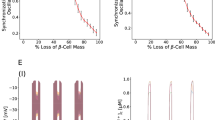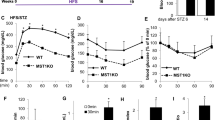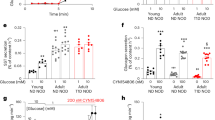Abstract
Glucose prevents the development of diabetes induced by alloxan. In the present study, the protective mechanism of glucose against alloxan-induced β-cell damage was investigated using HIT-T 15 cell, a Syrian hamster transformed β-cell line. Alloxan caused β-cell damages with DNA fragmentation, inhibition of glucose-stimulated insulin release, and decrease of cellular ATP level, but all of these β-cell damages by alloxan were prevented by the presence of 20 mM glucose. Oligomycin, a specific inhibitor of ATP synthase, completely abolished the protective effects of glucose against alloxan-induced cell damage. Furthermore, treatment of nuclei isolated from HIT-T15 cells with ATP significantly prevented the DNA fragmentation induced by Ca2+. The results indicate that ATP produced during glucose metabolism plays a pivotal role in the protection of glucose against alloxan-induced β-cell damage.
Similar content being viewed by others
Article PDF
Author information
Authors and Affiliations
Rights and permissions
This is an Open Access article distributed under the terms of the Creative Commons Attribution Non-Commercial License (http://creativecommons.org/licenses/by-nc/3.0/) which permits unrestricted non-commercial use, distribution, and reproduction in any medium, provided the original work is properly cited.
About this article
Cite this article
Rho, HW., Lee, JN., Kim, HR. et al. Protective mechanism of glucose against alloxan-induced β-cell damage: pivotal role of ATP. Exp Mol Med 32, 12–17 (2000). https://doi.org/10.1038/emm.2000.3
Published:
Issue date:
DOI: https://doi.org/10.1038/emm.2000.3
Keywords
This article is cited by
-
A novel in vitro approach to test the effectiveness of fish oil in ameliorating type 1 diabetes
Molecular and Cellular Biochemistry (2022)
-
Ameliorating Effects of Quercetin in a Diabetic Rat Model with Social Anxiety Disorder
Toxicology and Environmental Health Sciences (2019)
-
β-Cell protection and antidiabetic activities of Crassocephalum crepidioides (Asteraceae) Benth. S. Moore extract against alloxan-induced oxidative stress via regulation of apoptosis and reactive oxygen species (ROS)
BMC Complementary and Alternative Medicine (2017)



